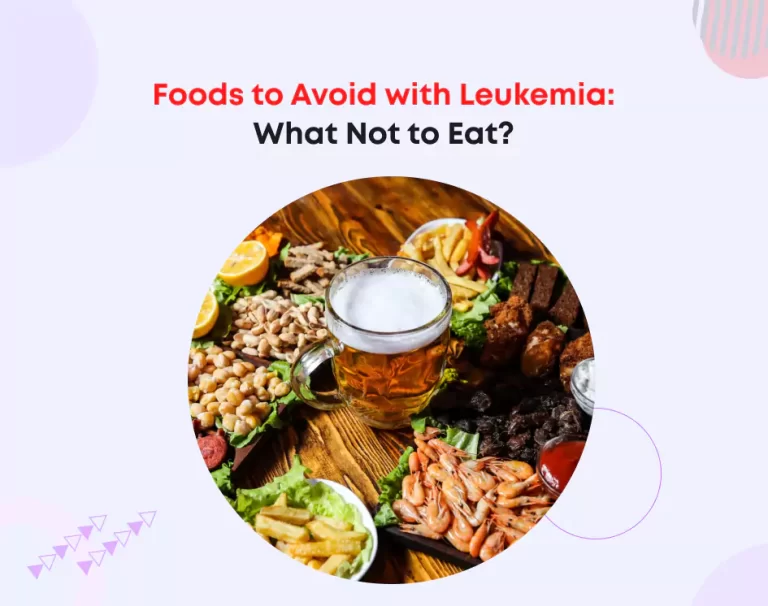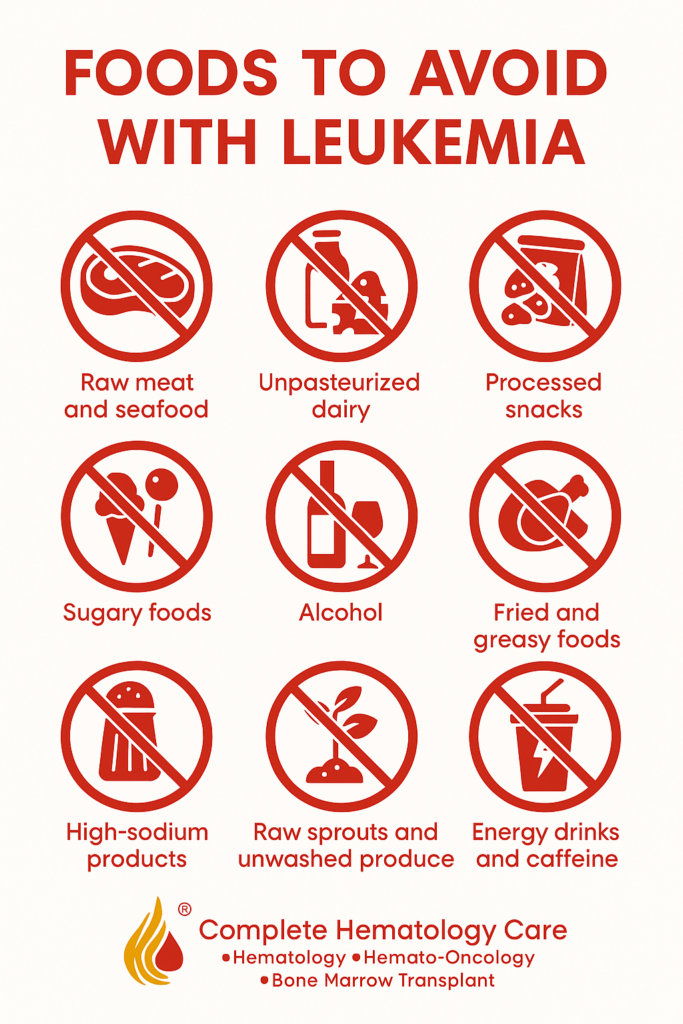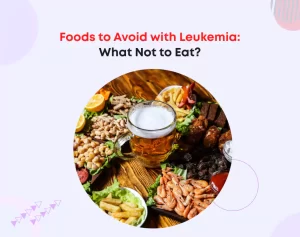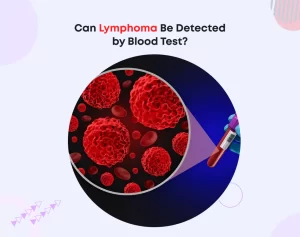
Foods to Avoid with Leukemia: What Not to Eat?
Leukemia is a form of cancer that originates in the blood and bone marrow. Managing leukemia involves not just medical treatments like chemotherapy or radiation, but also a strong focus on lifestyle changes—especially diet. Eating the right foods can support your immune system, but equally important is knowing which leukemia foods to avoid.
Why Diet Matters During Leukemia Treatment?
Leukemia and its treatments can weaken the immune system, making patients more vulnerable to infections and complications. While food cannot cure leukemia, the right diet can:
- Improve energy levels
- Support immunity
- Reduce inflammation
- Aid in faster recovery
- Prevent side effects like nausea or mouth sores
Conversely, eating the wrong foods can lead to infections, fatigue, and poor response to treatment. Let’s explore the foods that should be strictly avoided during leukemia treatment.
Leukemia Foods to Avoid

Raw or Undercooked Meat and Seafood
Leukemia weakens the immune system, increasing the risk of bacterial infections like salmonella or listeria.
Avoid:
- Sushi and sashimi
- Rare or medium-rare steak
- Raw oysters or clams
- Undercooked poultry or pork
Safer alternative:
Eat fully cooked meats, preferably grilled, baked, or steamed. Choose lean proteins like chicken, turkey, or plant-based options like lentils and beans.
Unpasteurized Dairy Products
Unpasteurized milk and cheeses can carry dangerous bacteria such as E. coli, listeria, and salmonella.
Avoid items like:
- Raw milk
- Brie, camembert, or blue cheese made with raw milk
- Unpasteurized yogurt or kefir
Safer alternative:
Stick with pasteurized dairy products or plant-based milk like almond, oat, or soy that are fortified with calcium and vitamin D.
Processed and Packaged Foods
Highly processed foods contain preservatives, artificial additives, and high sodium, which can weaken immunity and promote inflammation.
Examples include:
- Packaged snacks like chips and crackers
- Instant noodles
- Canned soups high in sodium
- Sugary cereals
Safer alternative:
Choose whole, minimally processed foods such as oats, fresh fruits, vegetables, and homemade snacks.
Sugary Foods and Beverages
Excess sugar promotes inflammation and can feed harmful bacteria and yeast in the body. It can also contribute to weight gain and increased fatigue.
Foods to avoid:
- Sodas and sweetened juices
- Cakes, cookies, and pastries
- Ice cream
- Candy and chocolate bars
Safer alternative:
Satisfy your sweet tooth with fresh fruits, smoothies without added sugar, and natural sweeteners like honey in moderation.
Alcohol
Alcohol interferes with liver function, which is vital for processing medications. It can also suppress the immune system and lead to dehydration.
- Beer, wine, hard liquor
- Mixed drinks
- Alcohol-infused desserts
Safer alternative:
Drink plenty of water, herbal teas, and coconut water to stay hydrated. Ask your doctor before consuming any alcohol, even in small amounts.
Greasy and Fried Foods
Fried and greasy foods can lead to digestive issues like bloating, nausea, and acid reflux—common side effects of cancer treatments.
Avoid foods like:
- French fries
- Fried chicken
- Deep-fried snacks
- Fast food burgers
Safer alternative:
Opt for baked, grilled, or steamed dishes that are easy on the stomach. Add good fats like avocado, nuts, seeds, and olive oil to your meals.
High-Sodium Foods
Excessive sodium increases the risk of high blood pressure, heart strain, and fluid retention—conditions already concerning for leukemia patients.
Avoid:
- Salted snacks
- Canned vegetables with added salt
- Pickles and processed meats
- Frozen ready-to-eat meals
Safer alternative:
Use herbs and spices for flavoring. Choose low-sodium or no-salt-added canned goods and prepare meals from scratch whenever possible.
Raw Sprouts and Unwashed Produce
Raw sprouts can harbor harmful bacteria, and unwashed fruits and vegetables can carry pesticides and microbes dangerous to immunocompromised individuals.
Foods to skip:
- Alfalfa, bean, or radish sprouts
- Unwashed salad greens
- Pre-cut fruit from salad bars
Safer alternative:
Always wash produce thoroughly. Steam or cook vegetables when possible, and avoid raw garnishes.
Energy Drinks and Caffeinated Beverages
Excessive caffeine can lead to dehydration, anxiety, and sleep disturbances—all harmful during leukemia treatment.
Avoid:
- Energy drinks
- Strong coffee
- Sugary caffeinated sodas
Safer alternative:
Choose herbal teas or caffeine-free beverages. Green tea in moderation may offer antioxidants, but consult your doctor first.
Conclusion
Fighting leukemia involves more than medications—it’s a lifestyle. Avoiding certain foods is a crucial step toward improving treatment outcomes, reducing side effects, and maintaining overall health.
Here’s a quick recap of leukemia foods to avoid:
- Raw meat and seafood
- Unpasteurized dairy
- Processed snacks
- Sugary foods
- Alcohol
- Fried and greasy foods
- High-sodium products
- Raw sprouts and unwashed produce
- Energy drinks and caffeine
Tip: Always consult with your healthcare provider or a registered dietitian before making major dietary changes. Every leukemia patient’s condition is unique, and personalized nutrition advice is best.
Frequently Asked Questions
Yes, certain foods can interfere with medications, lower immunity, or cause infections, which can affect treatment results.
Yes, but they must be thoroughly washed. Cooked vegetables are safer when the immune system is severely compromised.
Only under a doctor’s supervision. Some supplements may interfere with chemotherapy or other treatments.






